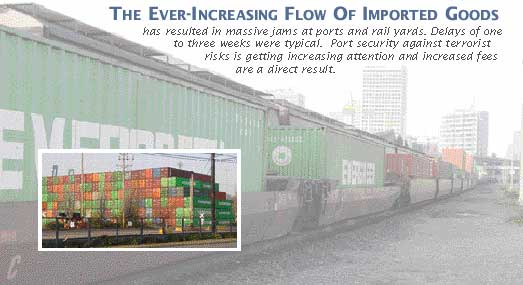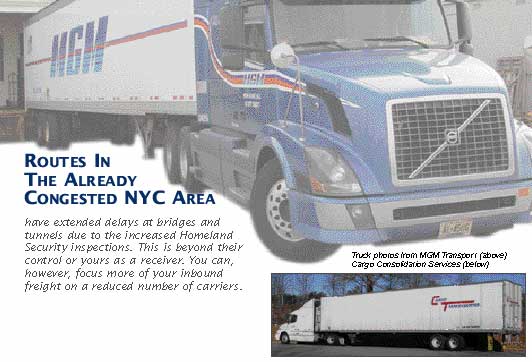Advice to partially offset inevitable cost increases and delays.
Notice: FURNITURE WORLD Magazine's "Beautiful Truck Contest" will recognize award winning furniture delivery truck graphics in the June/July issue. Click Here to download an entry form (pdf file).
If you thought coping with inbound transportation and deliveries to your customers was tough in 2004… fasten your seat belt and start working to control these important cost and service elements in 2005. You can minimize overall increases and may actually improve service and reduce costs. You will have to be on top of your game to make it happen.
Retailers that operate their own trucks share many of the same challenges as trucking companies that haul products from the manufacturers and the ports to your facilities. There truly is a shortage of qualified drivers for medium and heavy trucks. Fuel costs are 30% higher than a year ago while fuel economy is dropping due to new anti-pollution rules. Insurance is tougher to get and more costly. Maintenance, tires and virtually every cost associated with vehicles is higher.
The ever-increasing flow of imported goods has resulted in massive jams at ports and rail yards. When I visited the expanding port of Tacoma Washington in November, stacks of containers dominated the port's skyline and loaded trains stretched as far as the eye could see. Delays of one to three weeks were typical. Port security against terrorist risks is getting increasing attention and increased fees are a direct result. C-PAT is the abbreviated name for the Customs Trade Partnership Against Terrorism.
Direct importers should be participating in this program to minimize inspection and documentation delays. A key incentive to participate is a promise by U.S. Customs that the chance of delays for cargo inspections will be reduced if importers follow their security standards. The program has wide support among major retail importers.

Pat Smith, President of Cargo Consolidation Services reports that the changes in Hours of Service regulations have reduced truckload capacity about 16% at a time when demand has increased. This has made it necessary to increase driver wages and restructure routes to reduce empty miles. Detailed manifests are available in advance to receivers so they can have receiving paperwork and labels available before the truck arrives at its appointment time.
Michael Caldiero, Vice President of MGM Transport, notes that many of their routes in the already congested New York City areas have extended delays at bridges and tunnels due to the increased Homeland Security inspections. This is beyond their control or yours as a receiver. You can, however, focus more of your inbound freight on a reduced number of carriers. Instead of several carriers delivering a few pieces each; multiple shipments will arrive together in a more efficient manner.

MGM and Cargo Consolidation are both focused on driver retention to provide retailers with personnel who understand the handling challenges of our products. Furniture is more difficult to handle than the pallets of shrink-wrapped consumer products unloaded with fork lifts. When you are on the receiving dock, take a moment to thank them for their efforts and let them know they are important to your business.
Most estimates of transportation increases for 2005 are in the 4 to 7 per cent range unless there is a dramatic change in fuel costs.
Contributing editor Dan Bolger of The Bolger Group helps companies achieve improved transportation, warehousing and logistics. You can send inquiries on any aspect of transportation, warehousing or logistics issues to Dan at dbolger@furninfo.com